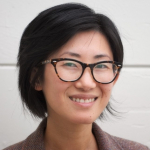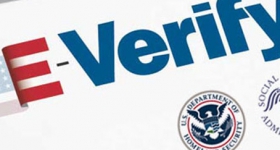Previously unknown in the world of electoral politics, Andrew Yang announced his bid for the presidency in November 2017. And if you have been paying any attention to the top 10 contenders, you may have noticed him — near the bottom of the list. As Yang often introduces himself, he is the “Asian guy running for president who wants to give everyone $1,000 a month.” Beyond that, you might be wondering what his deal is. Here is a look at Yang, what that $1,000 dollars is about and how he approaches some of the most pressing issues of our day.
A son of immigrants from Taiwan, Yang’s father worked for IBM; his mother, at a local university in upstate New York. Growing up, he was bullied for being the “lone skinny Asian kid in an all-white neighborhood.” He went to law school and quit law after five months on the job at a law firm. He then went on to found and lead several companies. At age 44, he’s running for president with merch branded “MATH,” short for “Make America Think Harder” — clearly, a retort to MAGA and a cheeky reference to Asians supposedly being good at math.
Yang comes off as casual and affable. His media appearances are peppered with self-deprecating jokes and chuckles. He points to the goal of a healthy, happy populace as the aim of unconventional policies like “free marriage counseling for all,” and he often cites social science research data when interviewers challenge him. He’s also raised eyebrows for some of the quirkier things he and his campaign have done, such as having crowds chant “PowerPoint” at rallies, dressing down on the debate stage and offering a stance on infant circumcision.
Yang’s book, The War On Normal People, is decidedly more serious. In it, he outlines the links between the loss of jobs due to automation and the social degradation of communities by measure of things like the opioid epidemic and higher suicide rates. Yang concludes that the best hope for the future is universal basic income (UBI). He warns, “The future without jobs will come to resemble either the cultivated benevolence of Star Trek or the desperate scramble for resources of Mad Max. Unless there is a dramatic course correction, I fear we are heading toward the latter.”
Echoing Jon Snow’s warnings that “winter is coming” in Game of Thrones, Yang, in an interview earlier this year, said, “No one wanted to rise to this particular challenge [of automation], so I’m running for president to help us evolve and advance to the next stage of our economy.”
Many of his policy proposals echo the Democratic Party’s priorities, such as healthcare reform, protection for reproductive rights and common-sense gun regulations, but his flagship proposal to address the sweeping changes expected with the next wave of automation is the “Freedom Dividend” — a cleverly-branded UBI proposal that would give all adult citizens in the United States $1,000 per month to spend as they choose, no strings attached.
Yang wants to pay for this in part with a new 10 percent value added tax (VAT).
But some, like Ajay Shenoy, Assistant Professor of Economics at UC Santa Cruz, aren’t convinced that a universal benefit is the most efficient way for the government to help those whose jobs will be displaced by the changing economy.
“The pattern of automation, even in more recent cases, does not look like massive sweeping unemployment,” Shenoy says. “Typically, it affects a small group of people and creates opportunities elsewhere.”
In that case, Shenoy argues that a costly multi-trillion-dollar program would not be the best way to target the problems created by automation. A more focused solution, he urges, would be “an earned income tax credit, which would also encourage working because you have to earn money in order to get it.”
When Yang talks about UBI, it’s clear that he believes such a systemic change would not only be a bailout for unemployed workers, but also a way to change society for the better by addressing issues of racial and gender inequality.
He often points to his own family’s experience to illustrate this point. “[The Freedom Dividend] would allow people to do the work they want to do, including people like my wife, who’s at home with our two young boys, one of whom is autistic,” he said in an interview on The View in July. “Right now, the market values her work at zero. GDP values her work at zero. If you put resources in our hands, it actually expands what we think of as work.”
When talking about who his UBI proposal will benefit, Yang argues that it will “disproportionately help people of color” because “money is the most effective way we can help people improve their situations with their families, their communities and themselves.” As examples, he cites “the waitress at the diner who’s getting harassed by her boss” and “the mom who’s stuck in an abusive relationship.”
He’s even more optimistic that the Freedom Dividend could reduce hate, racism and xenophobia; or at least, he says it’s a first step. At a CNN Town Hall on April 14, Yang explained, “If you feel like you don’t have a future and your kids don’t have a future … you’re much more subject to [hateful ideologies]. By getting the economic boot off people’s throat, hopefully we can alleviate this tribalism.”
“The next step after that is to convince people that these hateful ideologies are incorrect,” he added. “And that’s more difficult, it’s more painstaking, but over time, it’s our best path forward.”
There is evidence that UBI can be good for people. The Finnish government recently wrapped up an experiment comparing the recipients of their standard unemployment benefits with a UBI-like benefit that was unconditional. The government stopped the experiment after two years because there was no evidence that those who got the universal benefit were more likely to find work, but preliminary results did show that those who received the unconditional benefit were happier, healthier, less stressed and had more trust in institutions.
In the United States, Alaska has had a guaranteed payment to all residents since 1982 that’s generated from oil fund interest. It’s very popular and doesn’t seem to negatively affect the state’s employment rate. Stockton, California, is also currently experimenting with a guaranteed income for 100 residents.
Whether UBI will also make American voters less susceptible to fear-based rhetoric and the scapegoating of immigrants is not certain. There’s not exactly research that has studied this, and successful implementation of UBI on the scale Yang is proposing is unprecedented. Economists don’t agree about what the net economic effects would be, and the sociocultural impact is perhaps even less clear. What Yang is selling is a vision that either appeals to voters emotionally, or not.
There’s a sticking point to when Yang talks about helping the underdog, one that might make other progressives question how committed he really is to their values. His approach to hard-hitting issues like racism and reproductive rights is so nuanced — or centrist, depending on your perspective — that it leaves a lot of room for interpretation.
His campaign slogan, “Not left, not right, but forward” attempts to circumvent the classic delineation of political bias. This tagline invokes the rational optimism that many of his supporters are drawn to, but does it side-step issues of inequality?
Despite Yang’s image being the opposite of courting controversy, Yang has seemingly garnered support from the cruder corners of the internet, including from leaders of the alt-right and white nationalists. Yang and his campaign have consistently denounced this support, but it raises the question: How does he think about racism in the current political climate?
In appearances he rarely invokes the word ‘racism’, even when it might be obvious. In an April interview with The Root, Yang elaborates: “One of the things going wrong in this country is that we’ve oversimplified racism.” Yang then draws a clear distinction between systemic racism and simply seeing differences in race. He’s implying here there can be a distinction between addressing systemic racism and individual implicit and explicit bias. But in practice, can this distinction be so clearly made?
Yang has also drawn questions for the fact that the Freedom Dividend would be dispensed to all citizens — without regard to means. When asked why he thinks it’s a good idea to give $1,000 a month to those who don’t need it, Yang responds that it “depoliticizes” and “destigmatizes” the payment while the very wealthy end up contributing more through the new VAT. Pragmatic, perhaps, but it may not resonate with progressives who believe that those with greater need should get more help, or that a firm hand is needed for correcting long-standing injustice. Alexandria Ocasio-Cortez, for example, supports a 70 percent marginal tax rate for the wealthiest earners.
Yang has been attacked by those all over the ideological spectrum for his UBI proposal. Libertarian think tank Mises Institute calls it “sinister” for expanding government. Socialist-leaning Current Affairs dubs it “depressing” and alleges that his policy may actually put some of the most vulnerable who rely on government benefits in a worse position because corporations will just pass their added tax liability onto consumers. Yang has responded to this point by suggesting that he will consider exempting certain consumer staples from the new VAT.
For practical and ideological purposes, this might be why Yang avoids labels all together.
Those who support his candidacy call themselves the Yang Gang, and they are all over the political spectrum. They organize in local chapters all over the United States and internationally. Some of them were proponents of UBI before the Yang candidacy, and some think he just makes a lot of sense. Many tend to be younger voters who love to meme him.
A quick search on YouTube for user-generated content by Yang supporters shows a few rap videos with between 18,000 and 43,000 views and several channels dedicated to Yang-related content, the most popular being “Nerds for Yang 2020” with over 6,200 subscribers. Local Yang Gang chapters are organized mostly through Facebook groups; at the time of writing, there are about 100.
For some, seeing a visibly Asian man put forward a vision for America as a presidential candidate has a more personal dimension. Carson Lam, a physician and entrepreneur, says of Yang’s candidacy, “That it’s happening is beautiful.” For Lam, who is Chinese American, Yang represents the tension he has felt between gratitude for his family’s instilling of cultural values and the side of him that “wanted to be freer.”
“He’s very hardworking, smart and empathetic,” said Lam. “But he doesn’t play it safe either. He takes risks and allows himself to be embarrassed. He proposes a bold solution and backs plans with real data.”
With all this, how do we make sense of Andrew Yang’s candidacy?
Politico is currently polling Yang at 2 percent of support from likely Democratic voters. With political heavy hitters like Joe Biden, Bernie Sanders and Elizabeth Warren leading the polls with a lot more support, it’s unlikely that Yang will gain enough momentum to surge ahead and win the nomination. It’s not fair yet, though, to completely discount his candidacy. Despite his lackluster first debate performance, Yang still picked up nearly 40,000 new Twitter followers, second that night only to Kamala Harris. He may pick up more momentum yet. And, since he recently became the ninth Democrat to qualify for the September debates, it looks like we’ll hear more from him in the coming months.
According to Yang, other politicians are hearing his warning cry about automation, including Joe Biden, who he says pulled Yang aside after the first debate and said, “No matter what happens, Andrew, you and I need to sit down and talk about the fourth industrial revolution because I’m terrified that we’re going to gut the middle class.”
If the goal is to educate the public and other politicians about a serious possibility of economic disruption right around the corner, one could say that his campaign has attained some degree of success.










Comments